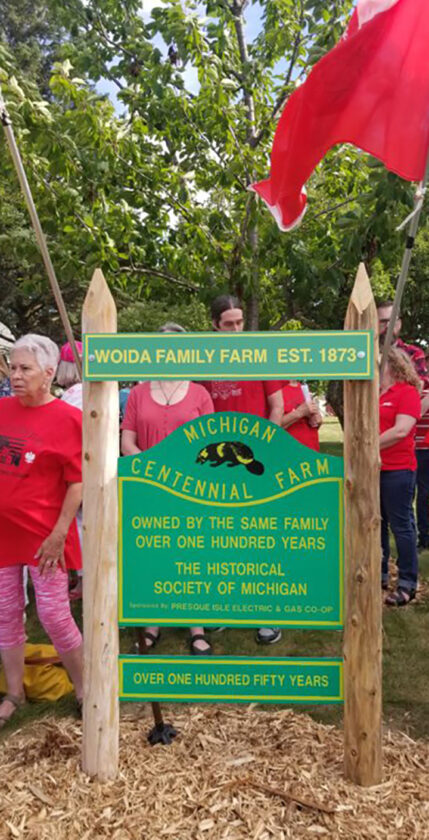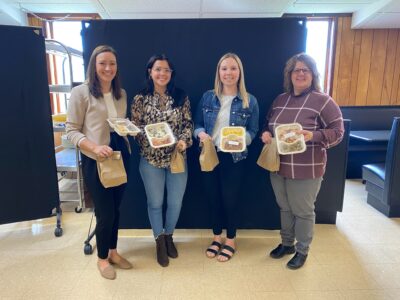Wojda/Woida family celebrates 150th reunion in Posen

Courtesy Photo Members of the Wojda/Woida family gather for their 150th reunion in Posen.
POSEN — The Wojda/Woida Family gathered for their 2023 reunion on July 29, attending a Mass of Thanksgiving at St. Casimir’s Catholic Church in Posen, enjoying relatives’ stories, good food, music, a hayride, and the dedication of a new Michigan State sign celebrating 150 years (1873 — 2023) of continuous ownership of the Homestead. Through marriage, there are now more than 500 different family names in the Wojda Clan, resulting in well over 2,500 descendants of patriarch Matthew Wojda, a farmer from Lobzenica.
The country of Poland is the land of Wojda/Woida ancestral roots. The first known patriarch, Matthew Wojda, was born about 1780 near Lobzenica, Poland, some 75 miles north of the city of Poznan. Around 1814, Matthew married Teresa Dzioba, who gave birth to Paul (Pawel), the second of seven children, in Falmierowo, Poland. Matthew and Teresa worked throughout the countryside as farmers and raised their family between the towns of Zlotow and Lobzenica.
As a young boy, Paul became a student of a Catholic canon priest, who took him to Zlotow, Poland around 1830. For the next 12 years, the priest taught Paul to read, write, pray, and perform other duties, including such things as harnessing the horses after Mass. His younger brother, Maciej, recalled one occasion when Paul attended a church fair in Gorka near Lobzenica and a priest who was supposed to preach a sermon in German was late. There was a tradition on the feast of Whitsuntide (Pentecost) that sermons were to be given in both Polish and German. The Polish canon priest said, “I will preach it although I am not prepared for it.” He did, however, end up preaching a very touching sermon in German.
As he grew up, Paul continued to develop his horse grooming skills and knowledge of farming. Around 1837, he married Joanna Mulka, and 10 children were born between 1838 and 1863. The fourth child was Jozef Wojda, born in Lobzonka, Poznan, Poland on Sept. 15, 1844. It was Jozef who would later homestead the family farm near Posen.
During September and October of 1866, some 100 people died of cholera in Lobzenica, Poland. About a year later, in January 1868, Paul and Joanna Wojda, along with the entire family except Jozef, immigrated to Quebec, Canada. The family eventually settled in Milwaukee, Wisconsin in the spring of 1868. Some of the Wojdas worked in the breweries in Milwaukee, and other family members constructed houses in the Milwaukee area.

Courtesy Photo Pictured here is the 150-year Michigan Centennial Farm sign issued by the Historical Society of Michigan.
Concerned about Jozef’s safety back home, Paul sent for him in early 1869. Jozef was just finishing up his three-year commitment in the German military under “Iron Chancellor” Bismarck, but as soon as he received word and passage fare, he set out for America. He traveled northwest through Poland to the Port of Bremen, Germany, where he boarded the SS Hermann as passenger #169 bound for the Port of New York. Jozef arrived in America on March 15, 1869, narrowly escaping the Franco-Prussian War of 1870-1871.
From New York, Jozef traveled west, passing through Pennsylvania and Ohio before arriving in Milwaukee to join his family. During 1870, he worked for a short while in a Milwaukee brewery with friend John Mulka. He then traveled to Presque Isle County, Michigan to work in a lumber camp in what is now the Village of Posen, under the profiteering lumber baron Albert Molitor. To escape the inhumane treatment of workers in the camp, one night Jozef fled the barracks through a window. Several others followed. That same year, Jozef returned to Milwaukee to marry Michalina Durecka on Sept. 8, 1870. Their first child, Balbina, was born in March 1872 in Milwaukee.
While working for Molitor as a blacksmith and lumberjack, Jozef had become well aware of the lay of the land in the vicinity. On Nov. 3, 1873 he purchased 80 acres, for the sum of $240, along the north edge of section five in Posen Township, now commonly known as Orchard Hill. During the winter of 1874, Jozef began burning the brush and removing the stumps and trees left behind by the lumberjacks to clear a site to build a log home.
Fourteen more children were born to Michalina and Jozef in Posen Township during the period of 1874 through 1899. Two of their children (second generation) later acquired the farm from them. The first was daughter Johanna (Wojda) and her husband Frank Rygwelski from 1909 to 1911. During their ownership, in 1911 Frank and Johanna reluctantly signed off about three cleared acres on the west edge of the farm to the Detroit and Mackinac Railroad.
The next year, Frank apparently was hired during the Calcite quarry startup, and so Johanna’s brother Joseph M. Woida was then able to leave Crawford’s Mill and repurchase the farm from them.
Joseph (second generation) married Michaline Romel of Posen, who eventually gave birth to nine children, seven of whom survived. Joe and his family commenced building up and operating the farm for the next 32 years. Joe excelled at his favorite trade of carpentry, but he was also a capable mason.
Joe’s son Henry (third generation) took over the farm in 1944, the same year he married Grace Janiszewski from Maple Ridge, about 100 miles south of the farm. Despite the distance, Henry and Grace were able to court, thanks to the Detroit and Mackinac passenger train, which ran on tracks (now a recreational trail) on the west edge of the farm. They raised nine children in the second homestead house, a “Starlight” Sears and Roebuck kit built by Henry’s parents when he was 5 years old.
After World War II, Hank, Grace, and family started a dairy operation. Brucellosis wiped out the herd, but a second herd was started in the 1950s. The family also grew potatoes and other cash crops and raised hogs and fowl. Off season during the winter months, Hank and sons could be found working in the woods north of U.S.-23. In a fitting reprise, Grace was treated to a nostalgic ride in the train engine on its last run from Orchard Hill to the Calcite Quarry in 2000.
Leo Woida (fourth generation) married Pamela Prieur from Alpena and purchased the farm in 1972. Leo had plans to farm, but when a surveying job opened up at Stoneport, he began a 30-year career there. Over the years, Pam worked at several care homes while they raised their five children. In 2002, Pam and Leo opened the Orchard adult foster care home on the farm, which has since been taken over by their daughter Michaelene (Woida) and Randy Kroll and is now called Orchard Manor.
Joseph T. Woida (fifth generation) purchased the farm in 2011. In 2019, Joe had the opportunity to repurchase the east 40 acres of the original homestead that Jozef had sold off in 1882 to help pay bills. The Sears and Roebuck house turns 100 this year and is currently being renovated by Joe. These days, Joe Woida and Sarah Purol are putting up hay, maintaining pasture fences, and raising several head of cattle. A few farm cats keep them company as life goes on at the Homestead. Three of Leo and Pam’s grandchildren (sixth generation) live on or near the farm and are often seen there, building more family memories.
This article was submitted to The News by Carl Woida.
- Courtesy Photo Members of the Wojda/Woida family gather for their 150th reunion in Posen.
- Courtesy Photo Pictured here is the 150-year Michigan Centennial Farm sign issued by the Historical Society of Michigan.








